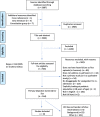Readmission rates following heart failure: a scoping review of sex and gender based considerations
- PMID: 32408892
- PMCID: PMC7222562
- DOI: 10.1186/s12872-020-01422-3
Readmission rates following heart failure: a scoping review of sex and gender based considerations
Abstract
Background: Although hospital readmission for heart failure (HF) is an issue for both men and women, little is known about differences in readmission rates by sex. Consequently, strategies to optimize readmission reduction programs and care strategies for women and men remain unclear. Our study aims were: (1) to identify studies examining readmission rates according to sex, and (2) to provide a qualitative overview of possible considerations for the impact of sex or gender.
Methods: We conducted a scoping review using the Arksey and O'Malley framework to include full text articles published between 2002 and 2017 drawn from multiple databases (MEDLINE, EMBASE), grey literature (i.e. National Technical information, Duck Duck Go), and expert consultation. Eligible articles included an index heart failure episode, readmission rates, and sex/gender-based analysis.
Results: The search generated 5887 articles, of which 746 underwent full abstract text consideration for eligibility. Of 164 eligible articles, 34 studies addressed the primary outcome, 103 studies considered sex differences as a secondary outcome and 25 studies stratified data for sex. Good inter-rater agreement was reached: 83% title/abstract; 88% full text; kappa: 0.69 (95%CI: 0.53-0.85). Twelve of 34 studies reported higher heart failure readmission rates for men and six studies reported higher heart failure readmission rates for women. Using non composite endpoints, five studies reported higher HF readmission rates for men compared to three studies reporting higher HF readmission rates for women. Overall, there was heterogeneity between studies when examined by sex, but one observation emerged that was related to the timing of readmissions. Readmission rates for men were higher when follow-up duration was longer than 1 year. Women were more likely to experience higher readmission rates than men when time to event was less than 1 year.
Conclusions: Future studies should consider different time horizons in their designs and avoid the use of composite measures, such as readmission rates combined with mortality, which are highly skewed by sex. Co-interventions and targeted post-discharge approaches with attention to sex would be of benefit to the HF patient population.
Conflict of interest statement
The authors declare that they have no competing interests.
Figures
References
-
- Bueno H, Ross JS, Wang Y, Chen J, Vidán MT, Normand SLT, Curtis JP, Drye EE, Lichtman JH, Keenan PS, Kosiborod M, Krumholz HM. Trends in length of stay and short-term outcomes among Medicare patients hospitalized for heart failure 1993-2006. JAMA. 2010;303(21):2141–2147. doi: 10.1001/jama.2010.748. - DOI - PMC - PubMed
Publication types
MeSH terms
Grants and funding
LinkOut - more resources
Full Text Sources
Medical
Research Materials
Miscellaneous


